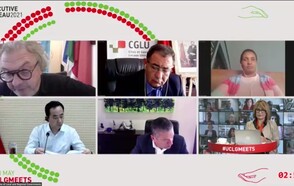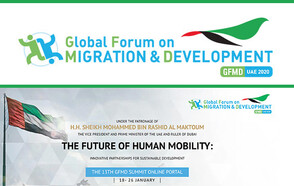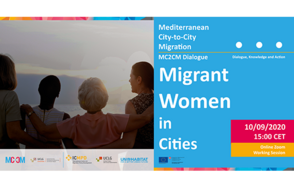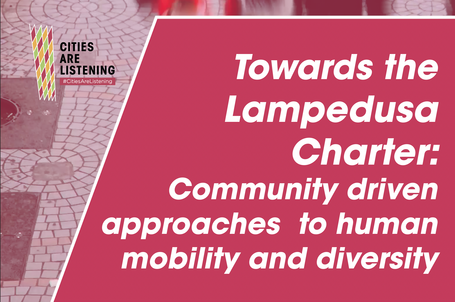
On 4 May, around twenty international actors and civil society partners met in a consultation chaired by Totò Martello, Mayor of Lampedusa, on the distinct visions and thematic priorities to inform the co-creation process that will lead to the Lampedusa Charter.
"Today we come together to give a boost to this Lampedusa Charter, which is deeply rooted in the spirit of UCLG. We are a small dot on the map, yet Lampedusa has a big heart and great ambition. Our ambition is to talk about peace and human rights, two concepts that cannot exist without each other".
Held in the framework of the #CitiesAreListening experiences, this consultation aimed to identify thematic priorities and connect the Charter proposal to international processes related to the governance of human mobility and diversity. In this sense, the session reaffirmed the commitment of local and regional governments to the implementation of the Global Compacts on Migration and Refugees , as well as to the localisation of the 2030 Agenda, in which the rights-based human mobility agenda is transversally present.
Emilia Saiz, Secretary General of UCLG, opened the meeting by recalling that the ultimate goal of the Lampedusa Charter is "to reshape the global narrative on human mobility and diversity and to examine this phenomenon from a local perspective: By contemplating this phenomenon from a local perspective, we aim to influence global policy making in this field and to shape new global visions".
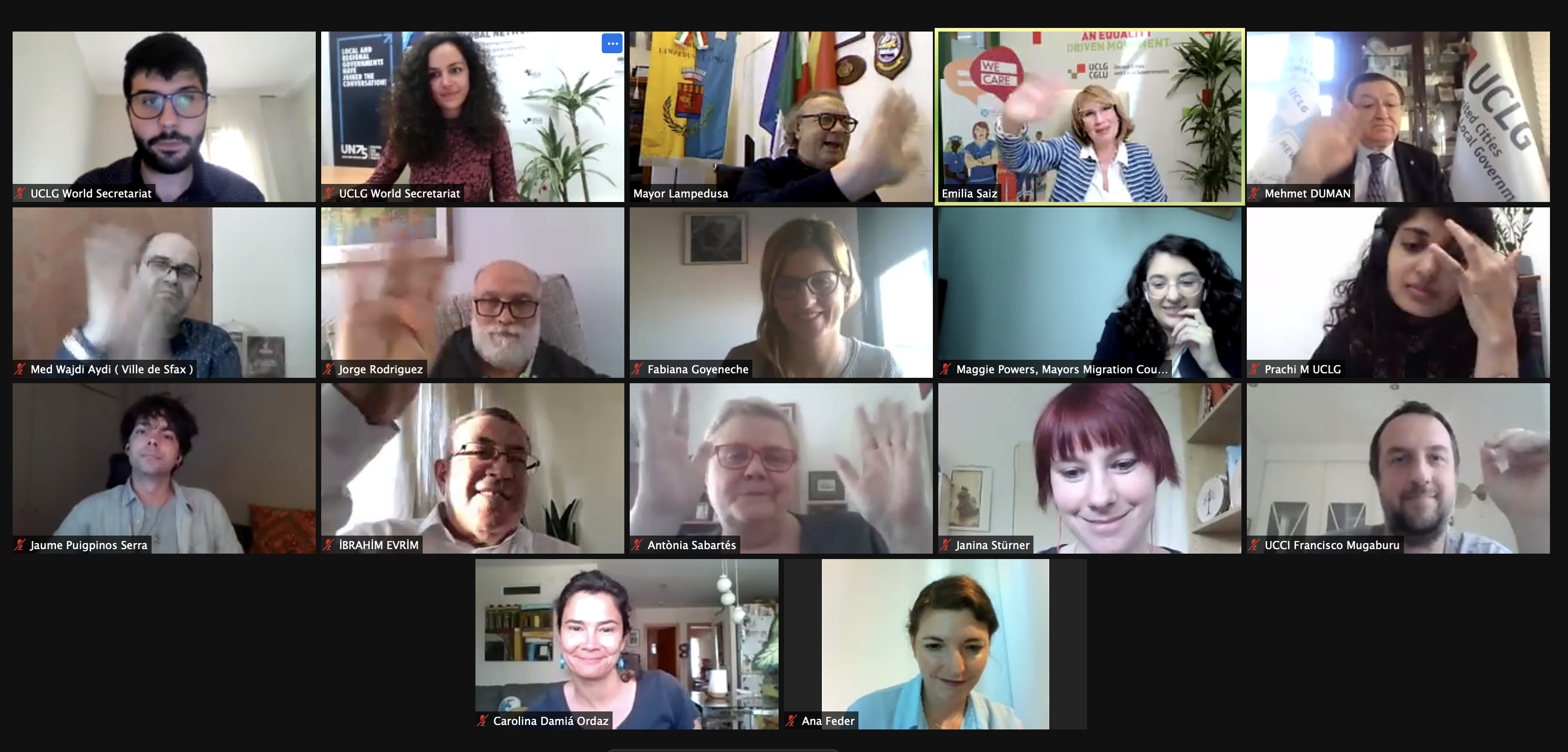 Jonathan Prentice, Head of the Secretariat of the UN Migration Network, which brings together the agencies involved in the implementation of the Global Compact on Migration (GCM) under the leadership of the International Organization for Migration (IOM), applauded the values underlying the charter proposal and asserted the importance of dialogue and cooperation between levels of government:
Jonathan Prentice, Head of the Secretariat of the UN Migration Network, which brings together the agencies involved in the implementation of the Global Compact on Migration (GCM) under the leadership of the International Organization for Migration (IOM), applauded the values underlying the charter proposal and asserted the importance of dialogue and cooperation between levels of government:
"The vision of the Mayor of Lampedusa is inspiring and I fully endorse it, as it embodies the fundamental guiding principles of the Global Compact on Migration (GCM): all human rights, for all people, without discrimination. No State can address the challenges of migration alone; it requires international cooperation and internal cooperation from all levels of government and all of society".
Armand Béouindé, Mayor of Ouagadougou and co-chair of the Politicy Council on the Right to the City and Inclusive Territories, recalled the importance of working together in an increasingly interdependent environment:
"Migrants should not be seen as a threat, but as developers of local economies and creators of knowledge. We must collectively contemplate how to include migrant populations in local development plans and how to anchor migration provisions in decentralisation frameworks".
Also participating in the session, the organised civil society actors highlighted the need for a holistic approach that encompasses both the diversity of territorial realities and the coherence and coordination crucial to influence global agendas.
Stephane Jaquemet, Policy Director at the International Catholic Migration Commission (ICMC), coordinator of the Civil Society Mechanism of the Global Forum on Migration and Development (GFMD) and member of the Civil Society Action Committee, noted the concordance between the Lampedusa proposal and the aspirations of civil society, with particular emphasis on the need for progress towards migration regularisation.
"It is now essential to translate this shared vision into a dialogue with the central governments that hold the key power when it comes to migration - issuing visas and also expulsion orders, among others. Building these bridges is crucial to advancing our vision."
Participants in the session reiterated the need to adopt intersectional approaches that integrate human mobility and diversity into urban governance and enable all communities to participate in the reformulation of an inclusive concept of citizenship. In this regard, the importance of strengthening the participation of migrants, refugees and displaced populations in the design of public policies was particularly emphasised, and the essential role of a just and positive narrative on human mobility was reiterated.
UCLG's main partners in advocacy and cooperation contributed their views on the direction and impact of the Charter at the global level. Ana Feder, Regional Portfolio Director of the International Centre for Migration Policy Development (ICMPD), suggested that the discourse and language of the Charter must be carefully deployed to ensure that migration is not only seen through a vector of vulnerability. Cécile Riallant, Head of Unit at the International Organization for Migration (IOM) proposed linking the principles of the Lampedusa Charter with the 2030 Agenda, to create synergies and build on the implementation efforts made towards the global agendas. Alexander Mundt, Senior Policy Advisor at the United Nations High Commissioner for Refugees (UNHCR) further added that this inclusive approach must be complemented by culturally sensitive, age-, gender- and diversity-based approaches. Colleen Thouez, Division Director of Welcoming and Integrated Societies at the Open Society International Migration Initiative, stressed that local governments need both narrative support, to translate perceived migration challenges into opportunities, through effective diversity management, and with financial support by the international system and other funding channels. Maggie Powers, Head of Policy and Advocacy at the Mayors Migration Council (MMC), reaffirmed the value of this process in building more equitable societies as a means to recovery, with a particular focus on the intersectionality between the priority agendas such as migration and climate. Stephanie Loose, Human Settlements Officer at UN-Habitat, recommended that the charter must adopt a cross-sectoral approach, that goes beyond human rights andencompasses the whole of urban planning and service delivery.
In turn, city representatives added to these contributions with complementary visions based on their experiences on the ground. Wajdi Aydi, Deputy Mayor of Sfax, recalled the limits of one-size-fits-all approaches , and stressed that solutions must come from local governments from humanistic perspectives based on solidarity. Nastaran Nazhdaghi, Head of the Urban Regeneration Office in Shiraz, pointed out the difference between engagement and active participation, asserting that local communities should not be merely engaged, but should be actively involved in building local capacities for an all-inclusive delivery of basic services. Ibrahim Ervin, Advisor to the Mayor of Mersin, reaffirmed the commitment of the Global Taskforce on Migration (GTFM) to the Charter to enable local governments to optimise their contributions towards the governance of migration. Rodrigo Ceballos, Director of Acompañamiento y Apoyo a Migrantes in Córdoba (Argentina) warning against the complexities of romanticizing the idea of the migrant person,recalled the importance of fostering their participation in public policy by facilitating their access to voting rights and collaboration with grassroots organisations representing migrant communities. Fabiana Goyeneche, Director of International Relations of Montevideo, urged for migration to be considered as a right and not a necessity and asserted that the migration phenomenon cannot be detached from its causes.











